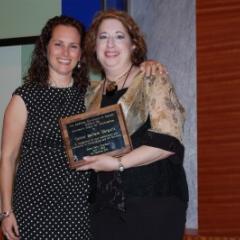
Volunteer of the Year for 2013: Cantor Barbara Margulis
In what capacity have you volunteered for the ACC?
I have been a board member since 2005. I was asked to serve on the Membership committee until 2008, when I was asked to chair the JCPC. In addition I chaired the registration materials committee for the San Francisco convention in 2008, after which I was asked to co-chair the Memphis convention in 2010. I’ve worked with the committees preparing registration materials for most of the conventions since Memphis. This past year President Susan Caro asked me to serve in a new position as Convention Planning Oversight Coordinator, to assist the folks in charge of planning the conventions. I’ve also written a few of the URJ articles. I’ve done my share of volunteer work for the ACC, but certainly no more a number of cantors I can name. I was surprised and very honored when Susan announced that I was the recipient of the 2013 President’s award.
What do you find especially rewarding about volunteering?
Volunteering is a way to be involved in the work of the ACC. I like being involved in what’s going on in our movement; it’s nice to know you’ve had a hand in it. Serving on the Board has enabled me to gain an understanding of what the ACC can actually do to help cantors increase the quality and productivity of their respective cantorates. I guess I just enjoy being a part of all that! Also, being on the board, has given me an understanding of where the ACC has been, an appreciation for where it is and an enthusiastic vision of where we are heading. It’s very exciting. If I’ve been a part of that, it’s great. I’d like to add that I’ve also sensed a stronger camaraderie between ACC and GTM members forming through the past few years, and especially during this last convention. It’s wonderful to watch our colleagues get to know each other and bond.
What, in your experience, is the best part of being a Cantor?
Combining different aspects of things I love to do: teaching adults and children, singing, conducting and arranging for our choirs, creating alternative worship experiences, meeting with couples and officiating at their weddings. I love being able to share in life-cycle events of my congregants. Helping people to express or feel their spirituality through music, through understanding of liturgy or though other shared experiences is, for me, the best part of being a cantor.
What do you see as the biggest challenge facing the cantorate, looking into the future?
Of course there are a number of challenges. Here are a few:
1. I graduated from HUC in 1985, as a young adult. Now in 2013 are communities have a whole new generation of young adults. It may be easy for those of us at a certain age to ignore this fact, but we do so at our peril. While remaining connected with our congregations as a whole, we need to make a special effort to understand this new generation of young adults and try to connect with them vis-à-vis their spiritual needs. We to make good use of our special training to meet those needs as much as we can.
2. Congregational life has changed. What I’m sensing, not only in my congregation, but also in other congregations when talking with colleagues, is that volunteerism is not there, or at least not on the scale that it used to be. Part of the reason may simply be attrition; congregational stalwarts begin to disappear from the pews, and no one appears to take their place.
3. Some congregations view cantors as luxuries. If our main role is that of a song-bird, then that is how we will be perceived, especially when financial times get tough. For years the ACC has been urging its members to take on additional clergy roles to those involving singing and performing. The challenge as I see it is to keep ourselves vital to the congregation’s spiritual health, so that we’re not considered a luxury, but rather a necessity.
What influenced you to become a Cantor?
I grew up in a classical Reform congregation. Growing up, I didn’t even know what a cantor was. The only cantor in Atlanta at that time was Isaac Goodfriend who served the large conservative congregation. At my temple we had a non-Jewish professional quartet. I was in the junior choir and I loved singing. I studied voice in college, and when I graduated I found a job teaching music in the religious school at another synagogue in Atlanta. My position grew and I found myself playing piano and singing for B’nei Mitzvah services, and teaching the junior choir. I discovered I loved doing these things! So I investigated what I needed to do to become a cantor, and I followed the path, though I did go and get earn my Master’s degree (in 1981) first.
Tell us something about yourself that we might not know, that you would want to tell us about
I love puns. I love humor. I love theatre, especially musicals. I usher at several theatres in Atlanta, allowing me to see touring shows, local productions, opera and ballet for free. I am very thrifty. I am blessed with a wonderful, supportive husband and four marvelous adult children. I am fortunate to have been with a warm, caring congregational community for almost 25 years.

